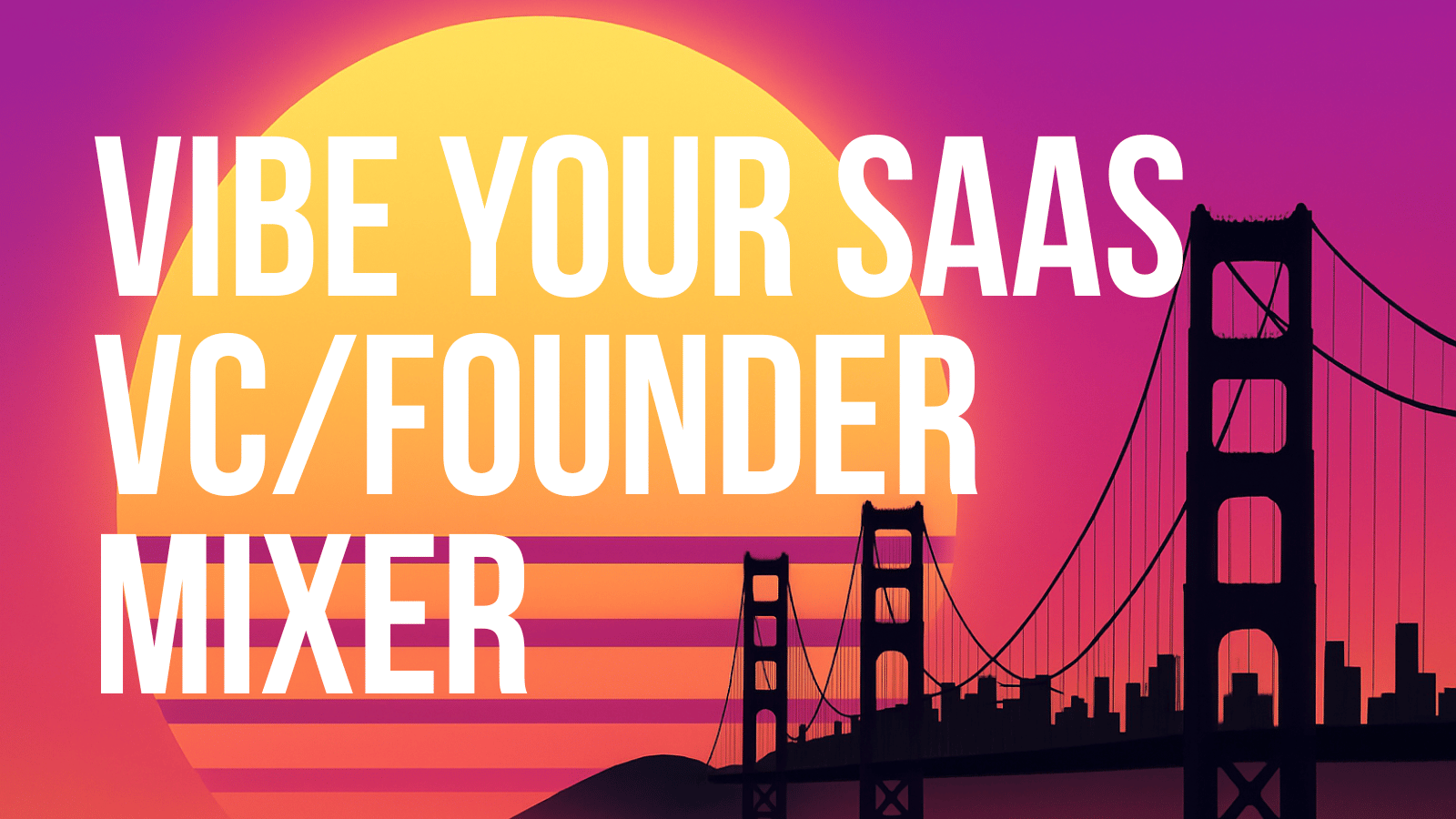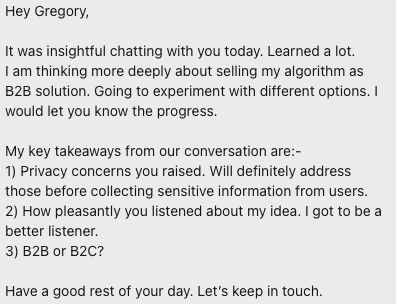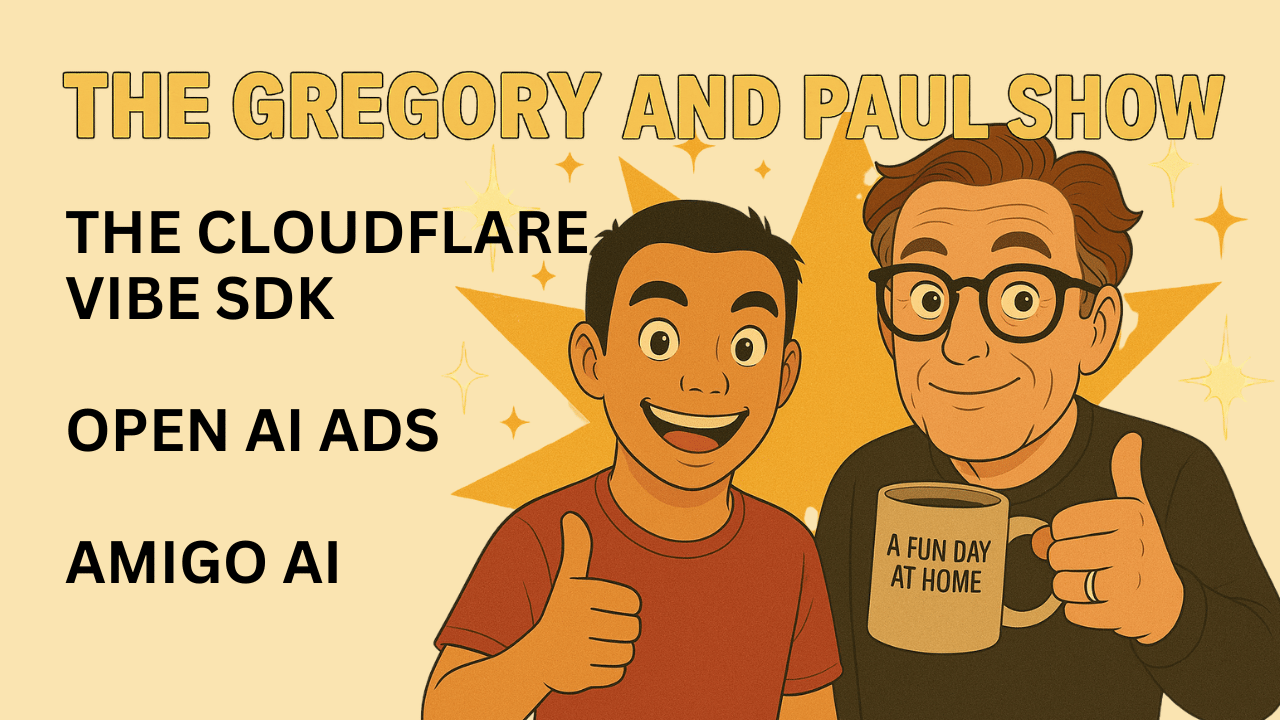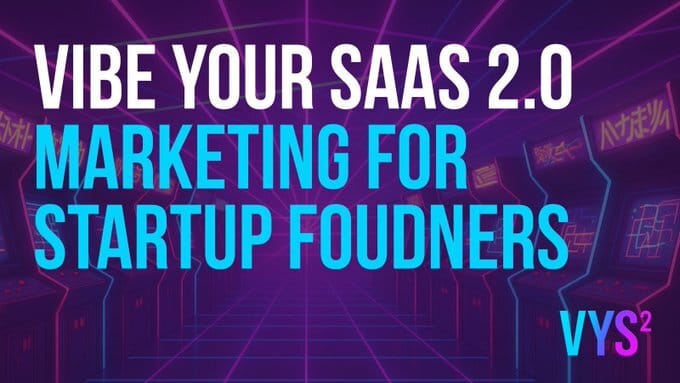


The Vibe Your SaaS Founder/Investor Mixer at TechCrunch Disrupt is the must-attend invite-only event this October in SF.
Oh, you haven’t heard about it?
Two Silicon Valley legends, Aaref Hilaly of Bain Capital Ventures and Gautam Gupta of Strata Capital, have agreed to join me and my co-host, Arjun Dev Arora, for an exclusive, founder-friendly event.
It’s During TechCrunch Disrupt on Tuesday, October 28, in San Francisco.
Who else is going to be there? Click here to find out.
If you'd like to attend, please add yourself to the waitlist. A few spots should become available as we approach the event.


Since it’s October and Halloween is approaching, I'll be celebrating with goth, punk, and 80s industrial darkwave playlists all month. I am giving out a darkwave trophy for best goth haircut. Send me your pics to participate. Yes, there will be an all Morrissey playlist next week because, like, he is my hero.

Every founder I speak to who has a B2C idea, I try to convince them to pivot to B2B. Why? Because B2C is exponentially harder than B2B. And it has everything to do with customer acquisition.
Sure, there are exceptions. If you have over one million followers on social media, a net worth of $10 million, or have sold three consumer apps, like Nikita Bier, go for it. However, that is not 99% of the people I meet or who read this newsletter.
It’s exactly what I told the founder I met with on Thursday.
He had a social B2C idea that was hard to monetize and even harder to scale. But I could tell that the underlying technology was interesting. I kept asking questions, and after much discussion, I asked him if he had considered selling the algorithm he had developed.
He got excited and told me all about its unique properties and advantages.
BINGO.
Coding algos was his passion and what he excelled at, not social networking apps. Many technical founders I meet who have developed some interesting core IP or technology wrap it in a B2C idea because that’s the best idea they have. This is because they are technical professionals, not marketing professionals. It’s also why it’s not that hard to convince them to go B2B.
He sent me the most polite thank-you note. I had to publish it here as an example for those seeking advice. If you want help, be kind to anyone who offers it to you.

Stop Reading This and Pivot to B2B
Why? Because it’s hard to attract users, hopefully, that’s enough for you, and you stop reading and pivot now. It will save you a lot of headaches if you do.
Most technical founders think B2C is the "easy" path. The product seems more straightforward since you're building for one user rather than an entire organization. There's no complex enterprise sales process to figure out, no dealing with procurement departments, and no endless approval cycles.
But that's the trap.
The simplicity is an illusion. What looks like a simpler product actually requires mastering the most complex and expensive marketing channels in existence.
The Math That Doesn't Add Up
B2C apps pay $20-50+ to acquire a user who might generate $5-10 in lifetime value. Remember, you're not just competing with other startups. You're competing against Netflix, Spotify, and gaming companies with $100M+ marketing budgets. Meanwhile, Facebook and Google ads have gotten exponentially more expensive over the past five years.
Even if you nail the acquisition, get viral loops to work, and hit 1,000,000 MAUs, the monetization is brutal. Consumers expect everything to be free or $2.99/month max. Freemium conversion rates typically hover around 2-5%, which means you need massive scale to survive. And when money gets tight, people cancel the "nice to have" apps first.
Consumer Behavior Works Against You
While you're optimizing algorithms, your competitors are optimizing TikTok ad creatives. While you're building features, they're building influencer relationships. While you're thinking about user experience, they're thinking about virality hooks.
You have literally seconds to hook someone before they delete your app. App store discovery is essentially pay-to-play now, and building habits is hard when people have 100+ apps installed. (I had a mobile app acquisition platform back in the day, so believe me when I say acquisition is now even more brutal than your worst possible nightmares.)
But the real kicker? Consumer decision-making is emotional and unpredictable. Someone might love your product but still churn because they "don't use it enough." Price sensitivity is extreme. A $1 increase can tank conversion rates.

Why B2B Actually IS Easier for Technical Founders
The unit economics in B2B, well, they work. Customers pay 10-100x more than consumers, often $50-500/month instead of $2-10/month. They don't casually cancel tools their business depends on, so churn rates are lower. You can model and predict revenue growth instead of Hoping for a Miracle (sung to the tune of Bloc Party’s, Helicopter).
Marketing Becomes Straightforward
There are defined channels like LinkedIn, industry publications (Sub), conferences, and cold email. Buyers have budgets and actual decision-making processes. Word-of-mouth is more powerful in professional networks because people share what actually helps them do their job better.
Here's the kicker: technical founders actually have a natural edge in B2B. Businesses buy from people who understand their technical problems. You're not competing against venture-funded consumer apps with massive marketing war chests. Product-market fit conversations are clearer and more direct because you can literally ask customers what they need and they'll tell you.

The Pivot Framework
If you're considering a B2B pivot, start by asking what business problem your current technology could solve. Then figure out which companies would pay to solve this faster or better, starting with industries where your technical expertise gives you an unfair advantage. The best B2B pivots happen when founders realize their core IP, the hard technical problems they've already solved, is exactly what some industry desperately needs.
The key question is how much time or money they'd save. If it's not at least 10x your price, keep digging. Finally, make sure you can identify and reach whoever has the budget and authority to actually buy this thing. Double down on it. Make yourself impossible to replace.
When everyone else is optimizing for efficiency, showing up as the authentic you is the only lasting unfair advantage left.
Your 'Boring' Technical Skills Are Gold Mines
B2C seems more straightforward because the initial product complexity is lower. But customer acquisition is expensive, no matter how you slice it, and the unit economics rarely work without massive scale.
B2B may seem harder because you have to understand business problems and sales processes. However, there are many smart people (some significantly smarter than me, but without great hair) who can help with go-to-market. The B2B startup playbook is relatively straightforward because you're building a sustainable business instead of a venture-funded user acquisition machine.
Here's what most technical founders miss: your deepest technical expertise is someone else's million-dollar problem. That algorithm you built for fun? Some industries are manually doing that work with spreadsheets. That data processing pipeline you think is "basic"? Companies are paying consultants six figures to hack together worse solutions.
The businesses aren't waiting for you to learn marketing. They're waiting for you to realize that the hard technical problems you've already solved are exactly what they need to buy from you.


On the Gregory and Paul Show, we break down the latest in startups, SaaS, AI, memes, and whatever the internet is debating this week.
This episode covers the finalized TikTok divestiture to a U.S. consortium, OpenAI quietly building adtech infrastructure, Cloudflare’s birthday product blitz, Figma’s leap into vibe-coded design, Facebook’s awkward AI image generator, Amigo’s uncanny AI avatars, and the MIT/HBR report on “work slop.”

NEW From Zero to 1M in ARR - How to Market Your Startup: Slides from the most popular talk at Seattle Tech Week. Get the free presentation →
How to Monetize Your Climate Startup: Strategies for transforming environmental tech into businesses. Get the free presentation →
The Vibe Marketer's Guide to Reddit: Unlock Reddit's massive marketing potential with this guide. Get the free presentation →
100 Reasons Customers Say “No” (And How to Make Them Say “Yes”): A Comprehensive Google Sheet breaks down 100 fixes. Get the free tool →
"Every marketing channel sucks right now": 19 unconventional Vibe Marketing ideas that Founders can harness. Get the free presentation →
30-Day SaaS Growth Plan Template: Designed for technical founders who’d rather be building. Get the free eBook →
How to get your first 1,000 followers on 𝕏: Building a large following on 𝕏 in 2025 is still possible. Get the free eBook →
VC Pitch Deck Templates for Founders: Based on the legendary Sequoia deck, built for real fundraising. Get the free templates →


Ninety-five percent of startups fail at marketing. Not because they don't have great products. They fail because marketing has become complicated. Expensive. Slow.
What if marketing could be simple?
This is why I created Vibe Your SaaS, an AI-first, micro-fractional CMO service.
Because marketing isn't about marketing, it's about becoming inevitable.
Here's how it works:
We identify your ideal customers
We turn your features into feelings people buy.
Then you launch.
Scale what works.
And if we're smart, with a bit of luck, we exit.
But here's what makes VYS different: You get me, a Silicon Valley veteran and three-time startup head of marketing. Every week for one hour. Plus, phone, email, and chat access. No gatekeepers.
You get C-level help without the C-level price tag.
Real founders. Real results.
VYS 2.0 doesn't just help you get customers. It helps you become inevitable.
Frameworks included:
Vibe 3-Month Marketing Plan: Go from idea to $10K+ MRR.
Minimum Sellable Product (MSP) Builder: Validate before you build.
B2B ICP Development Guide: Know exactly who to market to.
Competitive Landscape Evaluator: Know where you stand and how to win.
Messaging Framework: Turn features into feelings people buy.
Marketing Plan Templates: Copy-paste frameworks that convert.
Monthly Content Planning Doc: Never stare at a blank page again.
New frameworks in v2.0:
B2C ICP Development Guide: Know exactly who to market to.
Content Tech Stack Guide: Scale with automation.
Guide to Founder-Led Sales: How to get your first 10 to 20 to 50 sales.
I charge a simple flat monthly fee. No contract. No lock-in. No BS.
If you’re hesitating, I can promise you this: VYS is a fraction of the cost of Y Combinator, and will provide way more value.

I'm Gregory Kennedy, former creative director, 3x head of marketing, and founder of Vibe Your SaaS. I help early-stage startups build real momentum with strategic clarity, AI-driven execution, and zero BS.
How am I doing? What do you want more of, or maybe less of? Write me back and let me know your thoughts. I will write you back. It’s a promise.
Hope you like the new look and feel.


